
In 2024, Turning Off Two Factor Authentication From Apple iPhone 14? 5 Tips You Must Know

Turning Off Two Factor Authentication On Apple iPhone 14? 5 Tips You Must Know
Apple has produced one of the most consumed, acknowledged, and preferred smartphones that allowed them to rule the industry for a considerably long period of time. Their style and presentation were not the only reason that made people look forward to buying an iPhone. Apple created its own operating system and presented their own versions of security and protection. One of the most recognized and impeccable features offered by Apple in its innovative structure was the security and safety through Apple ID and Apple Account. Every important feature that operated throughout the Apple iPhone 14 or iPad was focused over a single entity, the Apple ID. However, apart from the Apple ID, there were several other layers of authentications and verifications that were added throughout the protocol structure. A couple of them are renowned as Two Factor Verification and Two Factor Authentication. This article produces a very generous set of advice that should be looked over while handing these layers of protection. To get a better understanding of the procedures involved, you need to look over the guide to gain better knowledge on how to turn off Two Factor Authentication on your Apple.

Part 1. Is two-step verification the same as two-factor authentication?
There might be a few differences involved in these two security models; however, it should be kept in mind that they focus their purpose on securing the Apple ID of the user. Two Factor Verification is a security protocol that protects access to the various activities performed through the Apple ID. It attenuates an extra verification step across the Apple iPhone 14 device in addition to the password for the Apple ID. The device receives a verification code from an authentication factor that allows the authorities to confirm the credibility of the user.
The Two Factor Authentication is considered as an upgrade to the Two Factor Verification, which was released two years after the Two Factor Verification, in 2015. This authentication method exempted the offline recovery keys and application-specific passcodes. They added a six-digit authentication code onto the original password and produced an offline, time-dependent code that is to be generated through the Settings of the trusted device of the user. This feature was appended into the iOS 9 and OS X El Capitan with a region-specific target.
Part 2. How to turn off two-step verification?
As you are aware of the Two-Step Verification process, it is quite easy and typical in configuring. However, when it comes to turning the settings off, it is also a simple and straightforward procedure that can be easily covered by following the steps provided below.
Step 1: You are required to open the Apple ID Account web page on your browser and sign in with your Apple ID credentials.
Step 2: As you log into the website, access the “Security” section, and tap “Edit” from the options provided on the list.
Step 3: Tap on the “Two-Step Verification” option and turn it off. Confirm to conclude the process. You may be required to select the new security questions and verify the data of birth in the process. As you would be done with it, an email would be received across your connected address for confirmation.
Part 3. How to turn off two-factor authentication? (lower than iOS 10.3)
Two Factor Authentication cannot be turned off in a few cases and accounts for iOS versions greater than 10.3. However, if you have activated Two Factor Authentication across the iOS versions lower than 10.3, you can deactivate the feature through a series of simple steps. The exemption of this security feature across your device leaves it protected only through a password and a few security questions. For turning off the Two Factor Authentication from your Apple device, you need to follow the steps provided as follows:
Step 1: Open your browser and access your Apple ID Account website. Provide the details of your Apple ID and log in.
Step 2: Tap on “Edit” in the “Security” section and turn off the “Two Factor Authentication” option.
Step 3: This would lead you to set new security questions for the Apple ID account, followed by a verification of your date of birth. The successful execution of the process would lead to turning it off.
Part 4. Why can’t you turn off two-factor authentication if you already use it? (iOS 10.3 and later)
For users who have an Apple device with an iOS 10.3 or later version, they cannot turn the Two Factor Authentication off after it is accessed. The latest iOS and macOS included extra layers of security in their features, which led towards a better security foundation and protection of information. Users who have updated their account information can unenroll in two weeks after updating. For this, you are required to simply access the confirmation email that you have received and tap on the link to approach the previous security settings. Thus, it makes it far more than impossible for users to turn their Two Factor Authentication off if they consider it unnecessary for their device. This feature is something that would always remain intact with their device as an extra layer of security. Its absence does leave a chance of illegal access to the Apple iPhone 14 device and an increased risk of a security breach. Since it is directly built across the Apple iPhone 14 device and its settings, this makes it a very hard-to-approach characteristic.
Part 5. How to turn off two-factor authentication by removing Apple ID
Users who are very reluctant to remove the two-factor authentication off their device can consider removing the Apple ID itself for fulfilling the purpose. However, when it comes to executing such tasks, the need for a third-party platform gets evident. Third-party platforms provided dedicated services in providing users with a unique platform of operation with an environment that suits their purpose perfectly. Many platforms provide such impressive services, yet the selection gets quite difficult for a series of reasons. The following pointers explain the reasons to the users over why they should focus on selecting a platform such as Dr. Fone – Screen Unlock (iOS) for this purpose.
- You need to have no excessive knowledge of handling the platform.
- You can cover all the dynamics of unlocking the Apple iPhone 14 device without the use of iTunes.
- The platform provides you with the ability to unlock the passcode of your Apple device with ease.
- It offers you to protect your device from the disabled state.
- Works across all models of iPhone, iPad, and iPod Touch.
- Provides services to the latest version of iOS.
Dr. Fone – Screen Unlock (iOS) makes it easy for the users to control and remove their Apple ID and disable the two-factor authentication across their device. However, when it comes to controlling the platform, it follows a few simple and efficient steps that would guide you in executing the task successfully.
Step 1: Connect your Device and Launch Application
You need to connect your Apple device with the desktop and launch Dr. Fone across the computer. Tap on the “Screen Unlock” tool present on the home window and proceed with the removal of two-factor authentication.

Step 2: Access Appropriate Option
On the next screen that opens, you are required to select “Unlock Apple ID” from the three options. Proceed to your Apple device to take the process further.
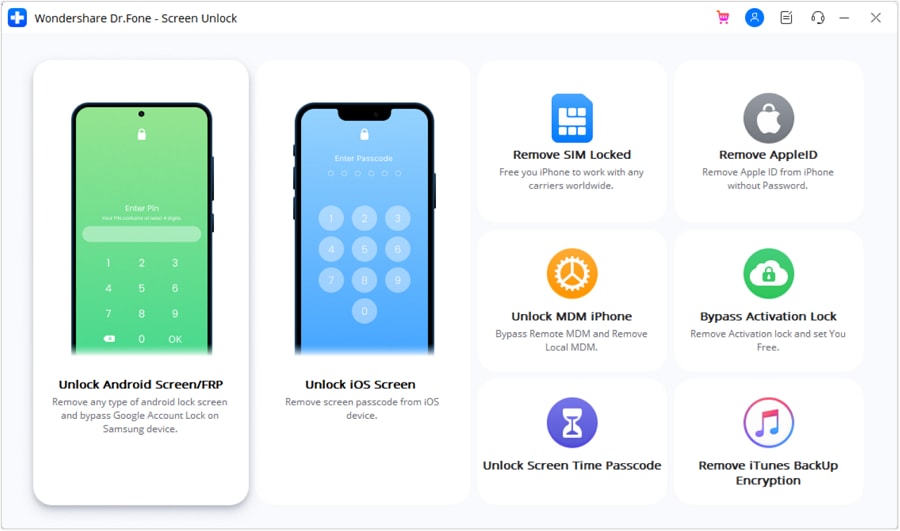
Step 3: Trust the Computer
Open the Apple iPhone 14 device and tap on “Trust” over the prompt that appears on the screen. Following this, you need to navigate to the Settings of your device to initiate a reboot.
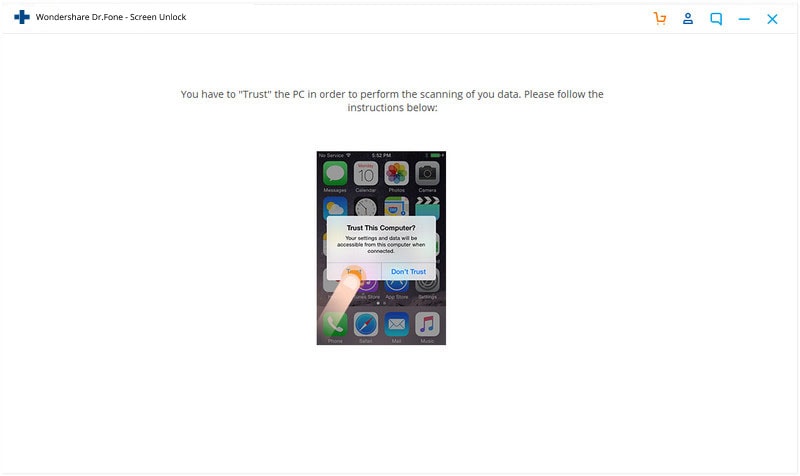
Step 4: Execution of Process
Once you are done with initiating a reboot, the platform automatically detects the update in the process and initiates removing the Apple ID from the Apple iPhone 14 device. Once the platform is done with the process, it provides a prompt message in the next window displaying the execution of the removal of Apple ID from your device. This also removes the Two Factor Authentication off your device.
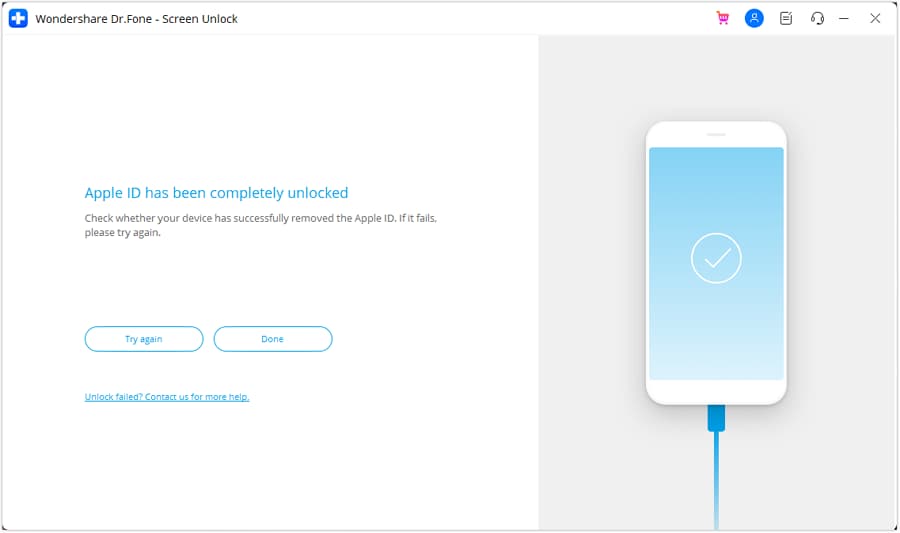
Conclusion
The article has presented a very detailed comparison of the Two Factor Verification and Two Factor Authentication and provided an elaborated discussion over how to turn these security features off their devices. The article also discussed a third-party platform that would guide in removing such security features of the Apple iPhone 14 devices over the requirement of the user. You need to go through this article to get a better knowledge of the execution of the mechanism.
Everything To Know About Apple ID Password Requirements For Apple iPhone 14
In the digital realm, your Apple ID is the guardian of your haven. Understanding the importance of a potent shield, this article delves into the essential realm of Apple ID password requirements.
A strong password is the key to safeguarding your digital kingdom. Dive in and unravel the significance of robust Apple ID passwords. Learn everything about the Apple ID password criteria and rules to secure your device. Fortify your Apple ID with simple yet effective measures because your device deserves the best defense!

Part I. Apple ID Password Requirements: What You Need To Know
Your Apple ID is the gatekeeper to a world of digital wonders, and a sturdy password is your first line of defense. Let’s unravel the secrets of crafting unbreakable Apple ID passwords with requirements examples that keep your account secure and your mind at ease.
- Length and Complexity
When it comes to passwords, size matters! Apple recommends a minimum of eight characters, but why stop there? Aim for a longer passphrase to add an extra layer of security. Mix it up with a blend of uppercase and lowercase letters, numbers, and sprinkle in some special characters for good measure.
- Variety is Key
To truly fortify your Apple ID, embrace diversity in your password creation. Incorporate a variety of characters, avoiding predictable sequences or easily guessable choices. This diversity acts as a shield against unauthorized access, making your password a robust fortress.
- Avoid Common Pitfalls
Beware of the password pitfalls! Apple urges users to steer clear of common patterns and dictionary words. Craft a password that is uniquely yours, steering away from easily guessable choices. You create a password that stands tall against potential threats by dodging the usual suspects.

Apple ID Password Criteria
Below are the Apple ID password rules for constructing a fortress-like password:
- Your password must not be your Apple ID or a minor variation.
- Avoid using the same password across multiple accounts.
- Regularly update your password for an added layer of security.
- Enabling two-factor authentication is your ally in the quest for an impenetrable Apple ID.
Understanding and implementing these guidelines isn’t just a security measure; it’s a digital necessity. In the next part of this series, you’ll explore practical tips for crafting a strong Apple ID password effortlessly. Stay tuned and continue your journey to fortify your digital world!
Part II. Best Practices for Creating a Strong Apple ID Password
Now that you’ve understood the Apple account password requirements, let’s embark on crafting a password that not only meets the criteria but also stands as a beacon of impenetrable security. Here are some simple yet effective best practices to guide you:

- Create Uniquely Memorable Passwords
Crafting a strong yet memorable password might seem challenging, but fear not! Blend words, add some numbers or special characters, and create a combination that is uniquely yours. This way, you ensure a password that’s strong and easy for you to recall.
- Embrace Password Managers
Why juggle multiple passwords in your mind when technology can lend a hand? Password managers are your digital sidekick, securely storing and organizing your passwords. They generate complex passwords for you, taking the hassle out of password creation and ensuring each account gets its unique shield.
- Regular Updates and Two-factor Authentication
Keep your digital fortress up to date by regularly refreshing your password. Set a reminder to change it periodically, adding an extra layer of security. And don’t forget the superhero of digital protection – two-factor authentication. Enabling this feature ensures that even if your password is known, an additional step is needed for access, making your Apple ID virtually impervious to unauthorized entry.
By incorporating these Apple account password requirements, you’re not just following rules but fortifying your Apple ID against potential threats. In the next part, you’ll see a couple of examples of strong Apple ID passwords. It will provide you with practical insights to elevate your digital security game.
Part III. Example of Strong Apple ID Passwords
Now that you know the groundwork for crafting a robust Apple ID password, let’s bring those concepts to life with practical examples. Remember, the key is to strike a balance between uniqueness and complexity. Here are a few examples to inspire your digital shield:

- Code 1: Sunrise$Pineapple42
Uniqueness: The combination of “Sunrise” and “Pineapple” adds a personal touch.
Complexity: Adding “$” and “42” meets Apple’s special character and number requirements.
- Code 2: Dance!Rainbow@73
Uniqueness: The pairing of “Dance” and “Rainbow” creates a memorable combination.
Complexity: Including “!” and “@73” adds the essential complexity.
- Code3: Adventure$4EverYolo
Uniqueness: Merging “Adventure” and “4EverYolo” gives a distinct touch.
Complexity: The presence of “$” and numbers meets the criteria for complexity.
These examples showcase the creativity and strength you can infuse into your Apple ID password with criteria. Remember, the goal is to make it yours, ensuring it’s easy to remember while providing a robust defense against unauthorized access. In the final segment, you’ll be introduced to a tool that extends this security mindset beyond Apple devices. Stay tuned for the exciting conclusion of this journey to fortify your digital presence!
Bonus: A Professional Solution for Bypassing Apple ID
As you navigate the digital security landscape, it’s crucial to extend your focus beyond Apple devices and explore solutions catering to the broader spectrum. Imagine this scenario: you’ve diligently followed the guidelines for creating a robust Apple ID password, but what if you find yourself locked out of your Android device due to a forgotten password? Fear not; here’s a reliable solution: Wondershare Dr.Fone - Screen Unlock (iOS).
Dr.Fone - Screen Unlock (iOS) isn’t just a tool confined to Apple’s realm; it’s your trusted ally in managing and securing Android devices’ passwords. If you ever find yourself unable to access your Android device, this professional solution steps in to efficiently unlock it, ensuring you regain control effortlessly.

Key Features and Benefits
Dr.Fone - Screen Unlock (iOS) is a user-friendly and efficient tool that goes beyond simple unlocking. Check out its key features and benefits below:
- **Effortless Unlocking.**Fone makes unlocking your iOS device a breeze. Regain access to your Apple iPhone 14 or iPad without any hassle, even if you forget your password.
- **Versatile Password Management.**Beyond unlocking, Dr.Fone manages various password types (PIN, pattern, password). Ensure your preferred method of device security is both convenient and secure.
- **Wide Device Compatibility.**Compatible with various iOS devices like iPhones and iPads. No matter which Apple device you have, Dr.Fone is ready to assist in unlocking and securing it.
- User-friendly Interface. Intuitive and easy-to-use interface. No technical expertise is required; effortlessly navigate and use the tool to unlock your device.
- **Secure Data Protection.**Protecting your data during the unlocking process. Your private information remains secure while regaining access to your device.
- **No Data Loss.**Unlock your device without losing any data. Regain access without sacrificing your photos, messages, or other important information.
- **Time-efficient Solution.**Fone swiftly unlocks your device. Regain access to your iOS device quickly, minimizing downtime.
- **Reliable Support.**Accessible customer support. Assistance is available if you encounter any issues or have questions during the unlocking process.
Step-by-Step Guide
The easy-to-follow steps provided below will make the unlocking process stress-free and straightforward.
- Step 1: Launch the iOS tool in a new window after downloading and installing Wondershare Dr.Fone on your PC. You may do this by navigating to Toolbox > Screen Unlock > iOS.
- Step 2: To unlock the iOS device screen, click the Unlock iOS Screen button in the popup that appears.
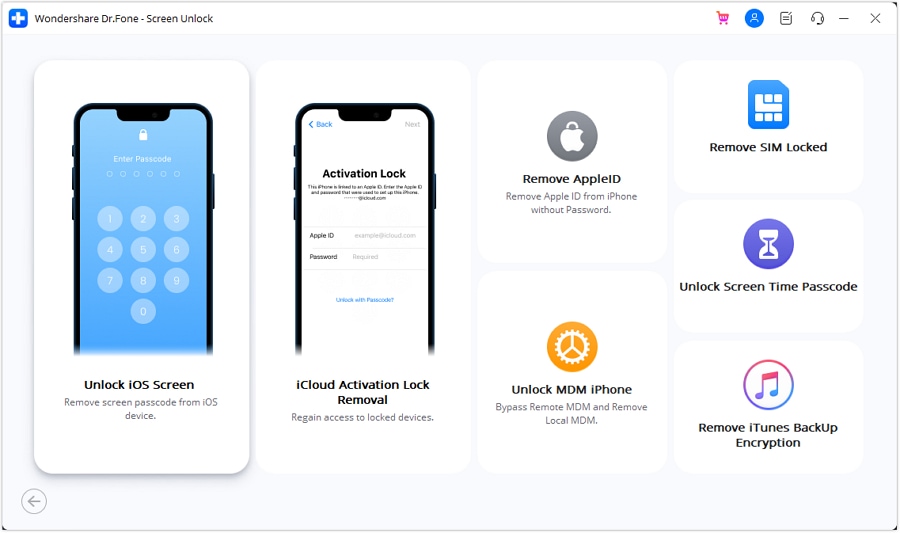
- Step 3: Click Start on the following screen to begin unlocking the iOS device. It is imperative that you check the battery life of your gadget before you proceed so the operation won’t get interrupted.
- Step 4: After that, you should switch your Apple iPhone 14 into Recovery mode. Just follow the on-screen prompts to switch your iOS device into the appropriate mode for your specific model. To get the instructions for entering DFU mode on the iDevice, click the Try DFU Mode button on the bottom if Recovery mode does not solve the problem.
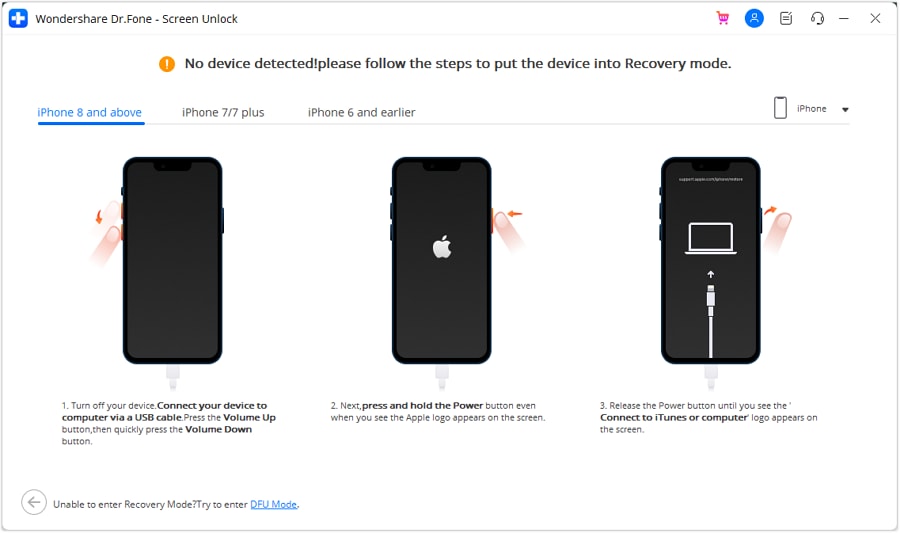
- Step 5: The platform automatically detects the Device Model and shows it in the corresponding section after the user successfully puts their iDevice into Recovery Mode. Adjust the model and choose the System Version to meet your needs. After that, hit Start to unlock your phone’s screen.
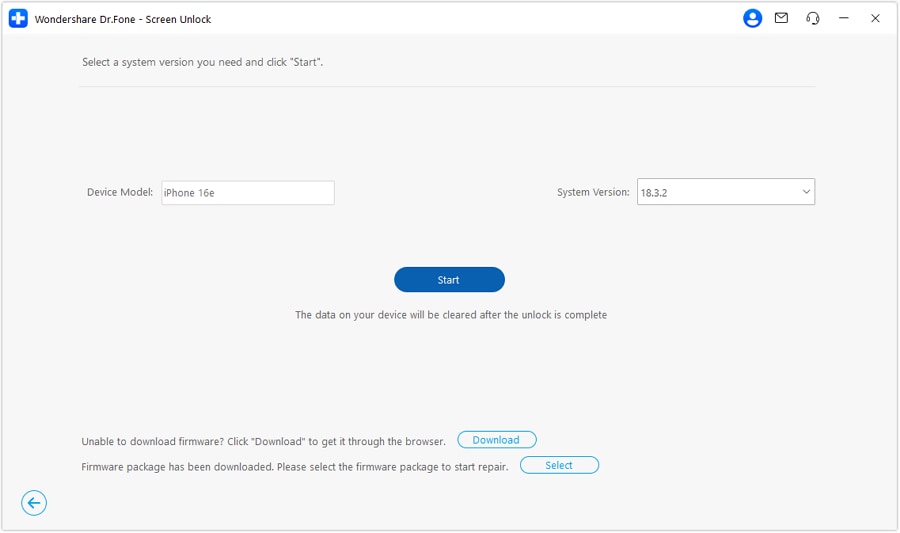
- Step 6: The following screen shows how far along the iOS firmware download is. To cancel out of it all, just hit the Stop button. If the platform’s iOS firmware download is taking too long, you can manually copy the URL to download the firmware by clicking the Copy button.
- Step 7: The next page will show the verification and installation of the iOS firmware if the download is successful. Press the Unlock Now button again to initiate the unlocking procedure.
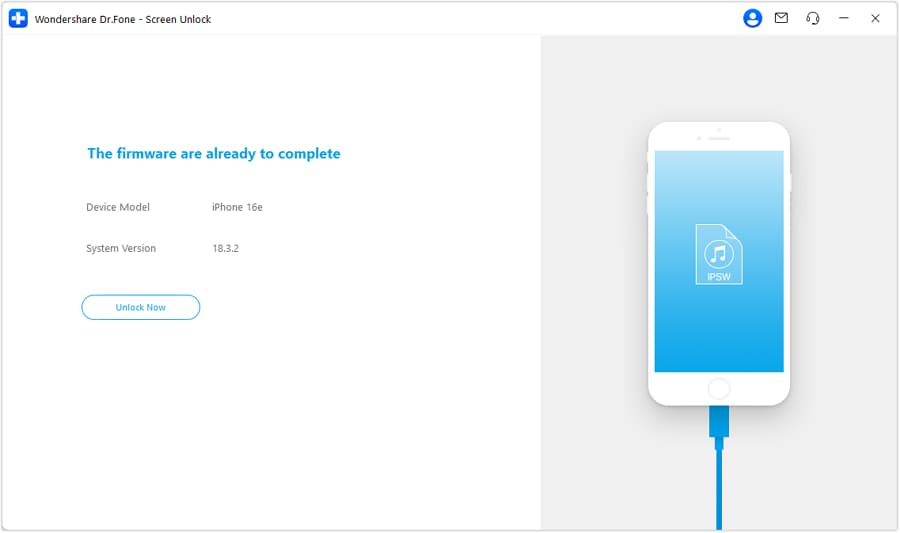
- Step 8: A confirmation window pops up on the screen to confirm the action. To proceed, enter the code and hit Unlock. You can see the iOS device’s progress bar on the following screen as it unlocks. Remember that the gadget must remain connected; otherwise, it will brick.
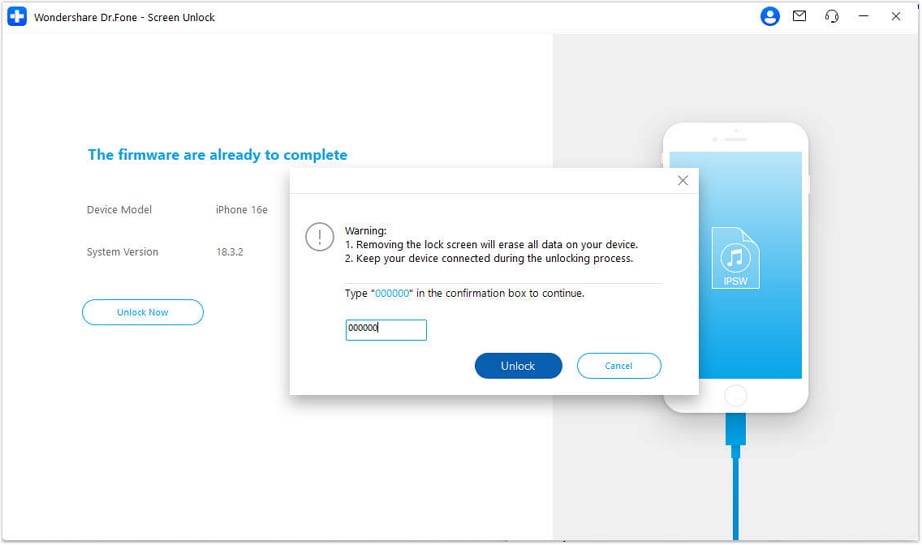
- Step 9: Once the iDevice has been successfully unlocked, click the Done button to complete the process. If you still have a locked iDevice, select Try Again to restart the process.
In essence, Dr.Fone - Screen Unlock (iOS) extends the principles of secure password management beyond the Apple ecosystem. It becomes a valuable asset in scenarios where accessing your iOS device becomes a challenge, ensuring you regain control without compromising security.
Conclusion
As this article wraps up the exploration of Apple ID password requirements, remember that protecting your information goes beyond a single device. Remember, strong passwords are your digital armor, shielding not only Apple devices but all corners of your digital world. Prioritize security across every device.
Dr.Fone - Screen Unlock (iOS) is the bridge that connects your commitment to security seamlessly. In the dynamic landscape of digital living, having a reliable companion like Dr.Fone - Screen Unlock (iOS) ensures you’re always in control, effortlessly managing and securing your passwords across various platforms.
Tips: Are you searching for a powerful Screen Unlock tool? No worries as Dr.Fone is here to help you. Download it and start a seamless unlock experience!
Apple ID Locked or Disabled On Apple iPhone 14? 7 Mehtods You Can’t-Miss
Apple ID refers to the authentication method available for the Apple iPhone 14 device to compromise users’ personal information and settings. The Apple iPhone 14 Apple ID will allow you to store and control data available on the Apple iPhone 14 device; however, you need to re-generate the Apple iPhone 14 passcode if you have forgotten the Apple iPhone 14 passcode. Suppose, if you have forgotten the passcode and entered the wrong passcode six times, your Apple iPhone 14 gets locked or has been disabled. According to your settings, if you have entered the wrong passcode too much time could even make your Apple iPhone 14 delete all the data available.
This article will discuss how you can unlock Apple ID and remain secure. If you receive a message that you have entered the wrong passcode or forgotten your passcode, you have to follow some steps to regain access to your Apple Id.
Why Is Your Apple ID Locked or Disabled?
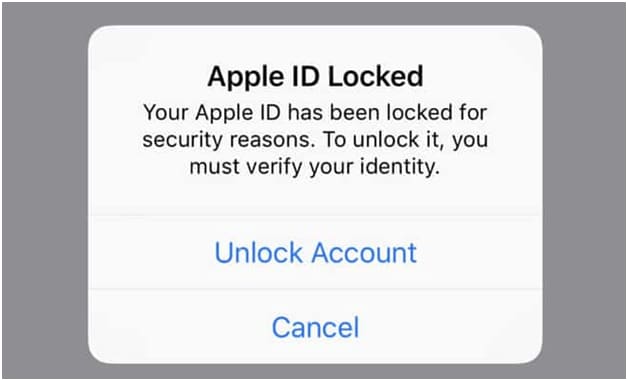
Some of the reasons causing your Apple ID locked or disabled are listed below:
- If you have entered the wrong passcode or security question too many times in a row, Apple ID gets locked. (Avoid entering the incorrect password more than 3 times)
- If you haven’t used your Apple ID for an extended period, possibly making your Apple ID disabled or locked. When Apple modifies the requirement for passcode and security questions, you have not updated the information.
If you frequently change your Apple ID or passcode on the Apple iPhone 14 device, Apple possibly considers that your Apple iPhone 14 faces a security threat and might lock your Apple ID.
Method 1: Professional iPhone Apple ID Lock Removal Tool [Recommended]
If you have forgotten your Apple ID password, you are suggested not to enter the wrong passcode in a row. That may lead to data loss. You can download the Dr.Fone– Screen Unlock, which is compatible with different lock screens and will unlock Apple ID easily. Dr.Fone - Screen Unlock helps remove almost all sorts of iPhone passwords without the requirement of technical knowledge.
Dr.Fone - Screen Unlock (iOS)
Unlock iPhone ID.
- Remove the screen password, face id, and Touch ID.
- Don’t need to have any technical knowledge.
- Bypass the Apple ID and iCloud activation lock in a quick way.
- Compatible with both Android and iOS devices.
3981454 people have downloaded it
Steps to Follow:
**Step 1:**Click on the “Screen Unlock” module and a new interface will appear.

To unlock your Apple ID, you have to click on the “Unlock Apple ID” option.

Step 2: You must know the passcode of the Apple iPhone 14 to unlock the phone screen, which trusts the computer system for scanning the data available in the phone.

Note: This process determines that all data will be erased when you initiate to unlock the Apple ID. (If your device didn’t activate dual authentication, then you can unlock Apple ID without data loss.) It is recommended to create a backup of your data before proceeding to the next step.

Step 3: Before unlocking your Apple ID, you have to reset iPhone settings by following the instruction available on the screen. When you have reset all the settings, restart your device, and the process of unlocking will start automatically.

Step 4: Once the restart process gets completed, Dr. Fone will automatically kick off the unlocking process of Apple ID and get it ended in a few seconds.
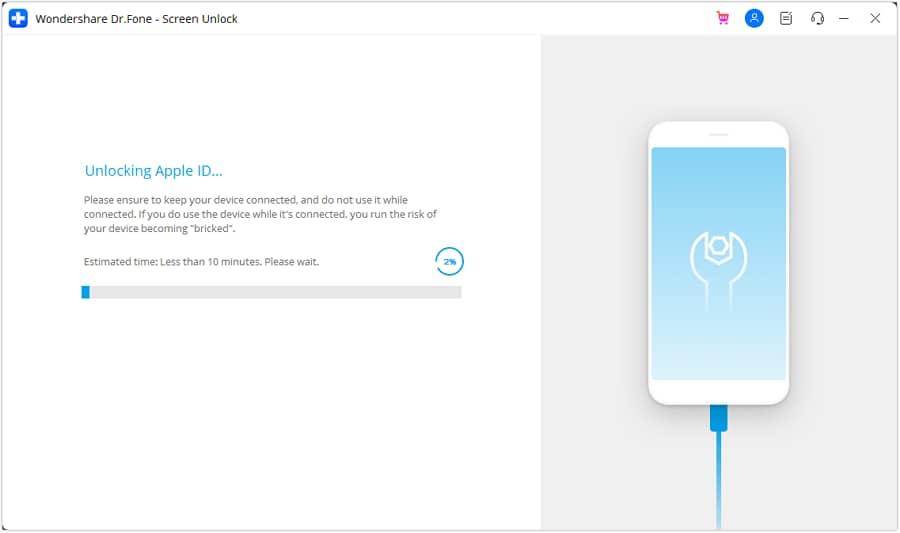
Step 5: When the Apple ID is unlocked successfully, the following window will indicate that you have to check if your Apple ID gets unlocked.

Method 2: Reset Password to Unlock Your Apple ID
In order to unlock iPhone 13 Apple ID, you can reset the password to your Apple ID. If you want to do this, you need to follow the below steps.
Step 1: Head to the Apple account recovery page and enter the desired details like your first and last name. Also, enter your email address. When done, click on the “Continue” button.
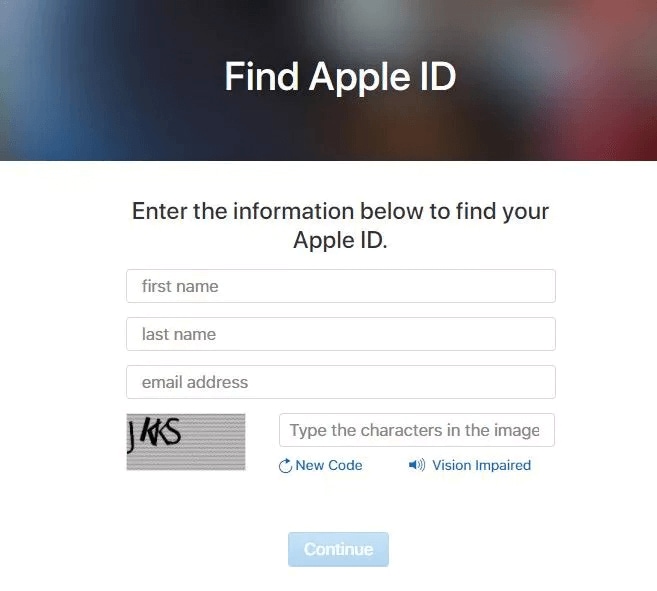
Step 2: When the next screen appears, you will see two options to choose from. Whether you wish to receive a password through email or answer a security question, choose it. Click “Continue”.
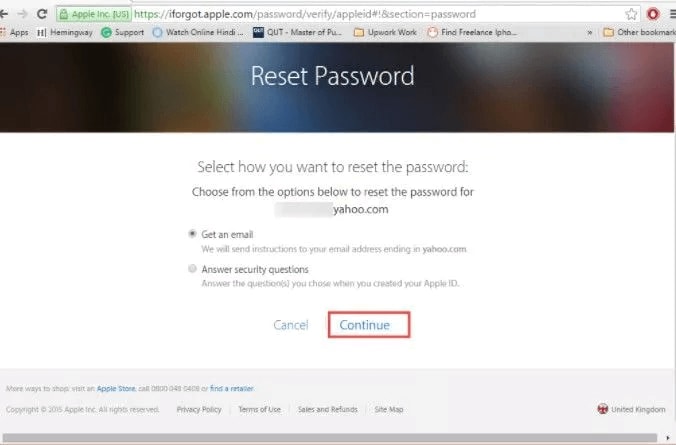
Step 3: Reset the password now. Write down the password and follow the prompts. Your password will be reset now!
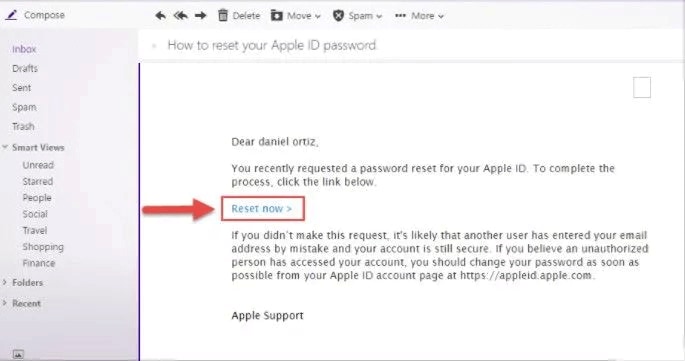
Method 3: Fix Apple ID Locked Via iforgot
If your Apple ID is disabled, follow these simple steps listed below:
Step 1: Enter “https://iforgot.apple.com “ in the web browser of your computer, iPhone or Tablet.
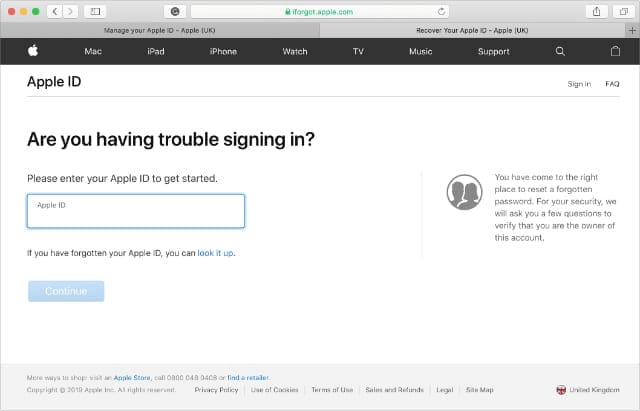
Step 2: You have to enter the registered E-mail address in the box available on the screen.
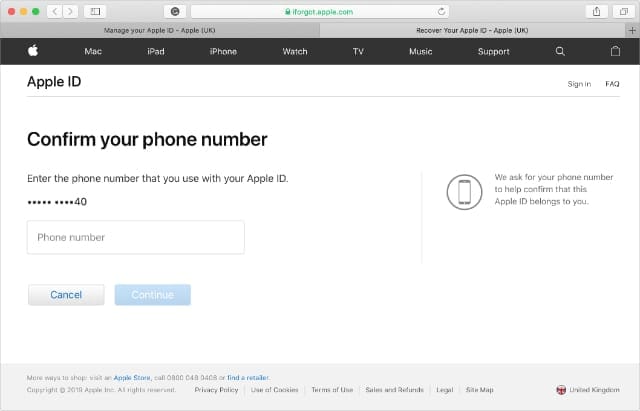
Step 3: Enter the captcha available on the screen and click on the “Continue “option to proceed further. (If you have set up the two-factor authentication, you will receive a code that you need to enter on your device.)
Step 4: Enter the code you have received on your device and confirm it to unlock your account and allow resetting the password. (You will be asked to answer the security question to confirm your identity).

Step 5: Successfully, you have unlocked your Apple ID.
Method 4: Unlock Apple ID Using Two-Factor Authentication
This next method only works if you’ve already enabled the Two-Factor Authentication before getting locked out of your Apple ID. In case you’ve already enabled it, follow the below-mentioned steps to unlock your Apple ID.
Step 1: Launch the “Settings” App on your Apple iPhone 14 and then hit “your name” at the top.
Step 2: Now, select the “Password & Security” option, followed by tapping on “Change Password.”
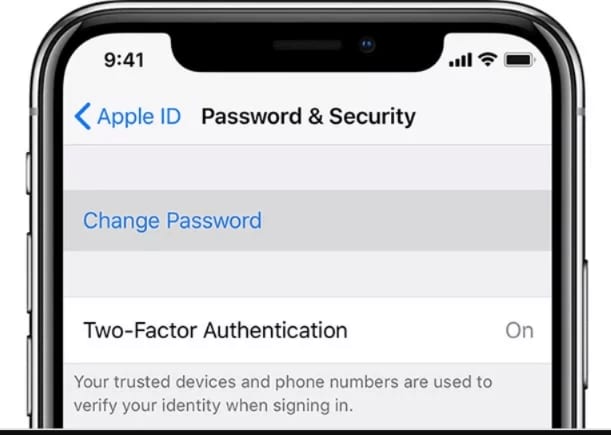
Step 3: Then you need to follow the instructions displayed over your screen carefully.
If you perform the instructions properly, you will eventually get your Apple ID unlocked.
Method 5: Remove Locked Apple ID Using Recovery Key
There are high chances that you might have protected your Apple ID with a Two-Factor Authentication. In such a case, you need to use your Recovery Key to unlock your Apple ID. Here’s how you can get it done.
Step 1: You need to first visit iforgot.apple.com and then punch in your Apple ID in the text field provided.
Step 2: You’ll then be required to enter the Recovery Key, key it in and hit “Continue”.
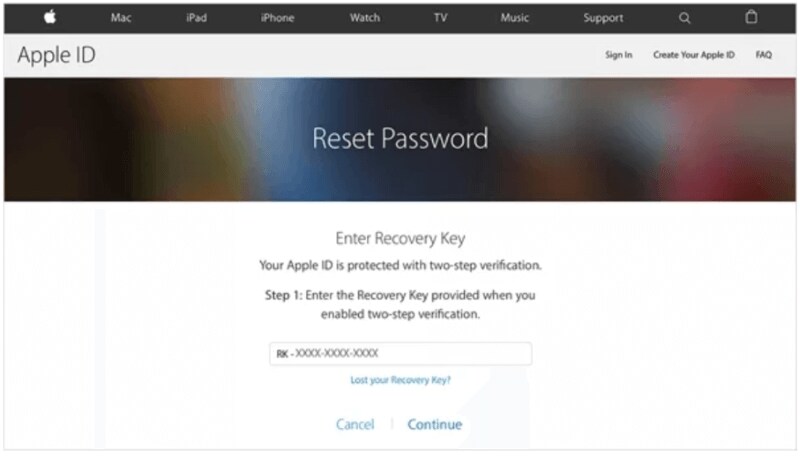
Note: Recovery Key is a security code provided to you when the Two-Factor Authentication is first enabled.
Step 3: Now, one of your trusted devices will receive a verification code. Enter it on your screen and hit “Next”.
Step 4: Upon successful verification, you will be asked to create a new password. Please make a new password now and then make sure to remember it.
That’s it you can now make use of this new password to unlock your Apple ID.
Method 6: A Loophole: DNS Bypass
If you want to unlock iPhone 13 Apple ID and don’t remember the password**,** you can use this DNS bypass method. But to make use of this method, you need to first factory reset your device and gain access to the “Hello” screen. Here’s how you can make use of this method.
Step 1: Firstly, you need to reboot your device into Recovery Mode. Then, launch iTunes and plug it in the computer. Now, iTunes will detect your device in recovery mode. Hit on Restore iPhone and wait for the process to complete.
Step 2: Your device will restart to the “Hello” screen upon completion. From the menu, choose language and country.
Step 3: Tap on “Proceed” to get into the Wi-Fi settings page.
Step 4: Now click on the “i” icon bonded by a circle next to Wi-Fi.
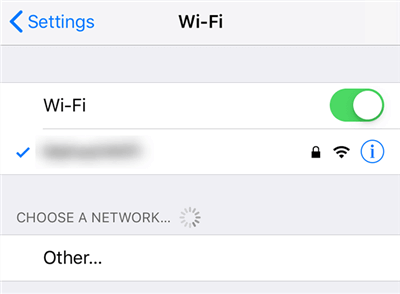
Note: In case, you are already connected to a Wi-Fi network, ensure to click on it first and then tap on “Forget This Network” to have the “i” icon visible.
Step 5: Now, when you tap on the “i” icon next to any Wi-Fi network (not connected), you need to look for the “Configure DNS” server option. Click on it and then select “Manual”, then click “Add Server.”
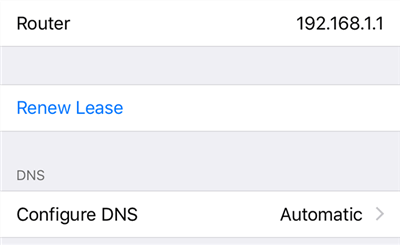
You have to select the DNS from the option available according to your region.
- USA/North America: 104.154.51.7
- Europe: 104.155.28.90
- Asia: 104.155.220.58
- Other areas: 78.109.17.60
Step 6: Now, save the settings, return to the connection page and connect to your Wi-Fi.
Step 7: You need to wait for your device to get connected with the iCloud DNS bypass server automatically.

Step 8: Once you are connected to the DNS server successfully, you can then use apps and features available on your Apple iPhone 14 in an alternative way.

Note: This method is just a hack to use your device without the need for Apple ID. This method doesn’t unlock your Apple ID.
Method 7: Ask Apple Support
We are positive that the solutions above will get your issue resolved. However, just in case, if you’re still stuck with the same issue and are unable to unlock Apple ID on iPhone, then we would suggest you get in touch with Apple Customer Support to help you with the best. You can either directly walk into your nearest Apple Support Center or simply visit https://support.apple.com/ to get in touch with one of the customer support executives.
Conclusion
From this article, you can know how to unlock your Apple ID and reset your password. There are different ways available that will resolve your unlock iPhone issue. However, Dr.Fone is the most recommended tool as it provides a screen lock solution and recognizes it as a one-stop solution for all iPhone problems. You can also share the effective methods in this article with your families and friends.
Also read:
- [New] 2024 Approved Proven Practice for Preserving Playthroughs Tips & Tricks for Recording Roblox Gameplay on a Mac
- [New] From Fumbling Clips to Viral Videos YouTube Edits Made Easy with Sony Vegas
- [Updated] 2024 Approved Chromatic Confluence Music & Photography Online
- Conversione OGV a OGG: Scarica Gratuitamente L'utilità Di Movavi
- How to Detect and Stop mSpy from Spying on Your Nokia 105 Classic | Dr.fone
- How To Erase an iPhone 14 Without Apple ID Password?
- In 2024, Apple ID Locked or Disabled From iPhone 6 Plus? 7 Mehtods You Cant-Miss
- In 2024, Best 10 Mock Location Apps Worth Trying On Honor 70 Lite 5G | Dr.fone
- In 2024, How To Reset the Security Questions of Your Apple ID From Your iPhone 14 Pro Max
- In 2024, How to Transfer Data from Lava Blaze Curve 5G to Any iOS Devices | Dr.fone
- In 2024, iCloud Separation How To Disconnect iPhone 15 Pro Max and iPad
- Mastering the Art of Windows 8'S Secure Operation - Graphics Driver Dispatchment
- The Most Useful Tips for Pokemon Go Ultra League On Samsung Galaxy Z Fold 5 | Dr.fone
- Title: In 2024, Turning Off Two Factor Authentication From Apple iPhone 14? 5 Tips You Must Know
- Author: Alma
- Created at : 2024-10-19 17:21:28
- Updated at : 2024-10-20 16:20:33
- Link: https://apple-account.techidaily.com/in-2024-turning-off-two-factor-authentication-from-apple-iphone-14-5-tips-you-must-know-by-drfone-ios/
- License: This work is licensed under CC BY-NC-SA 4.0.